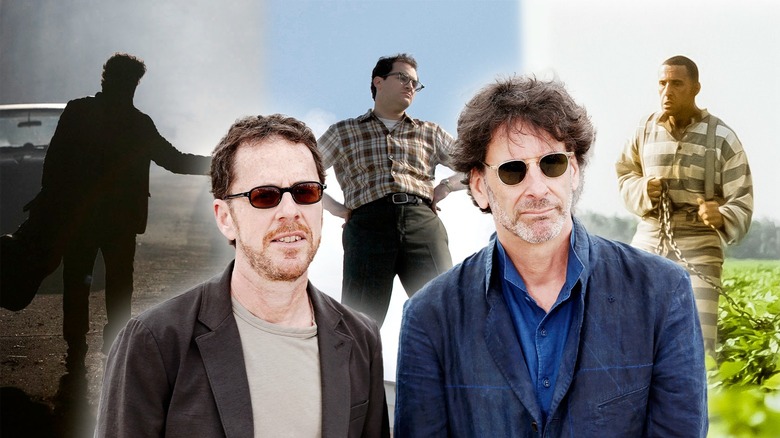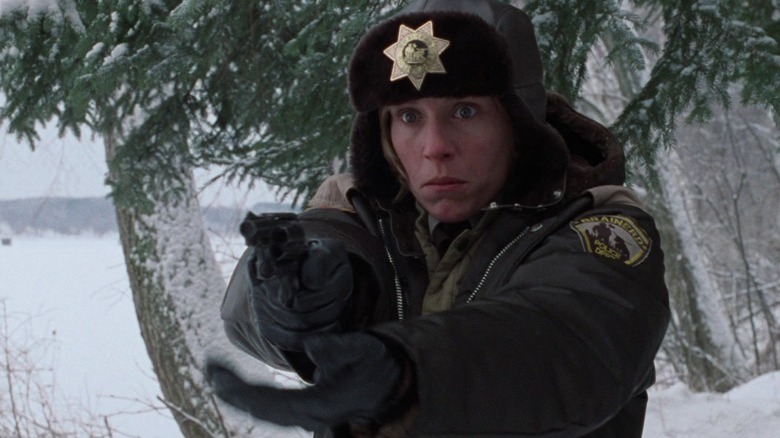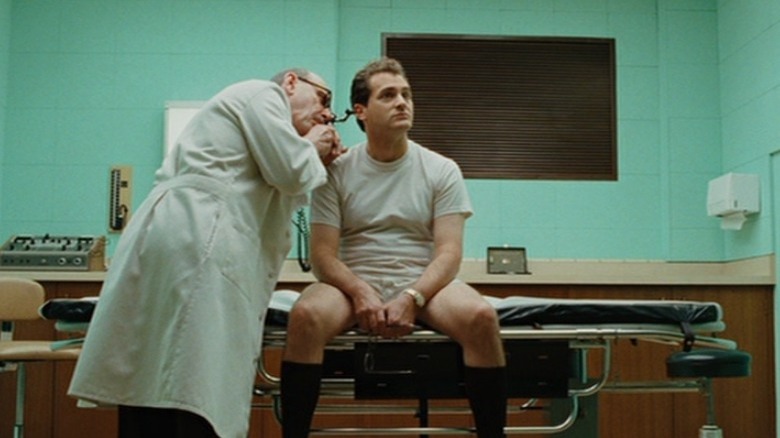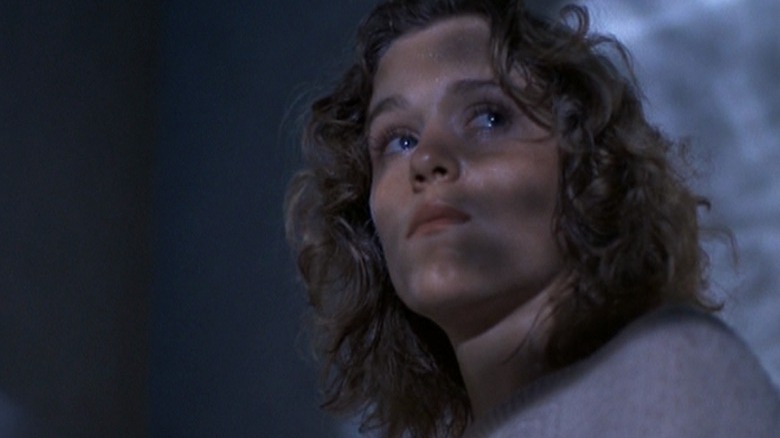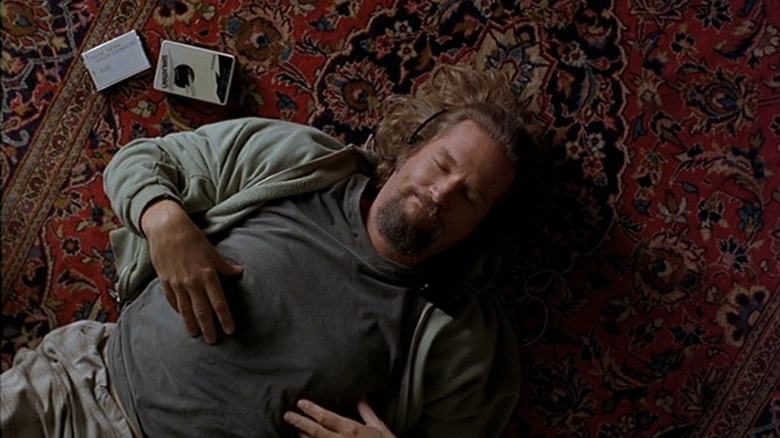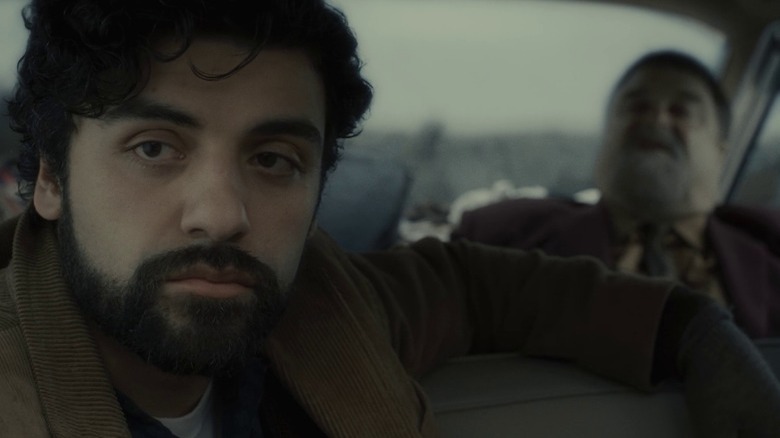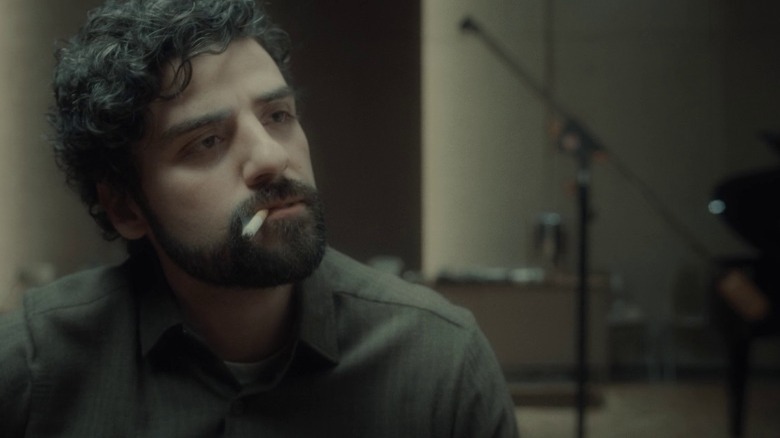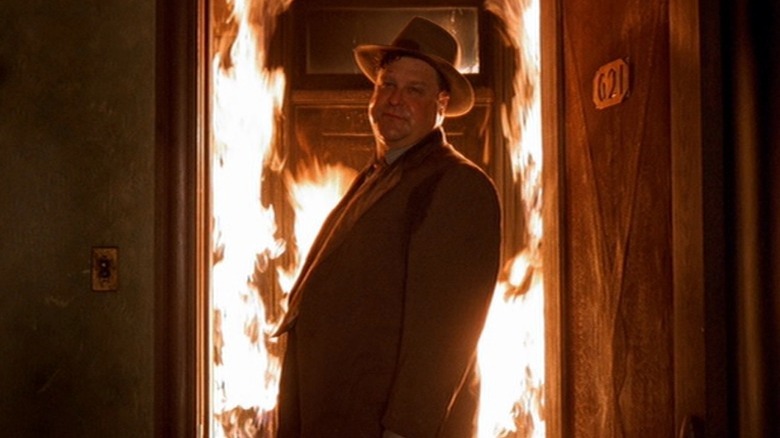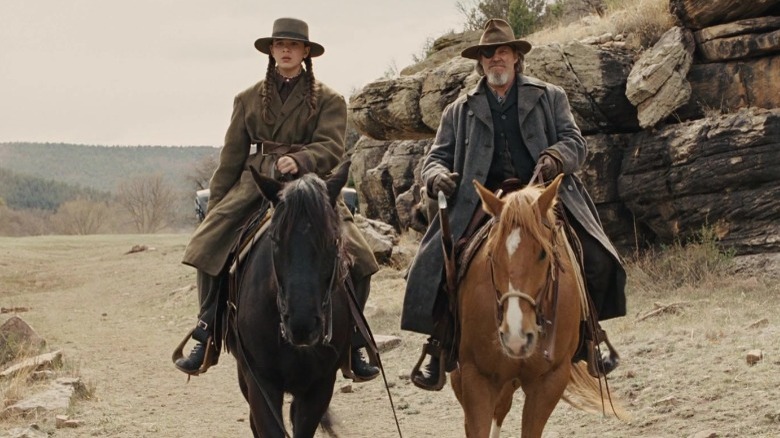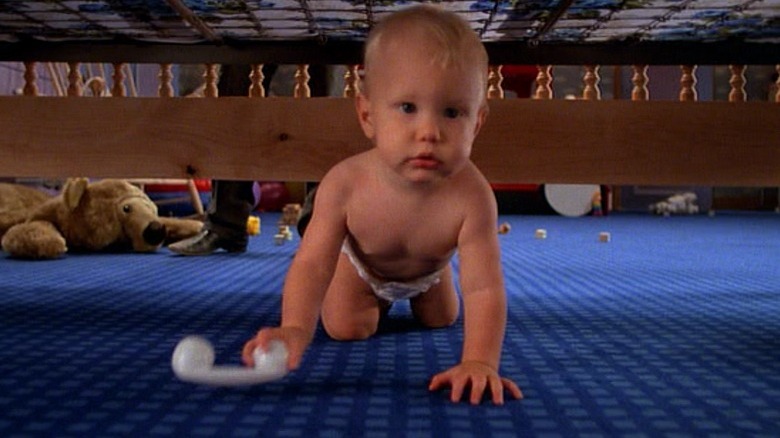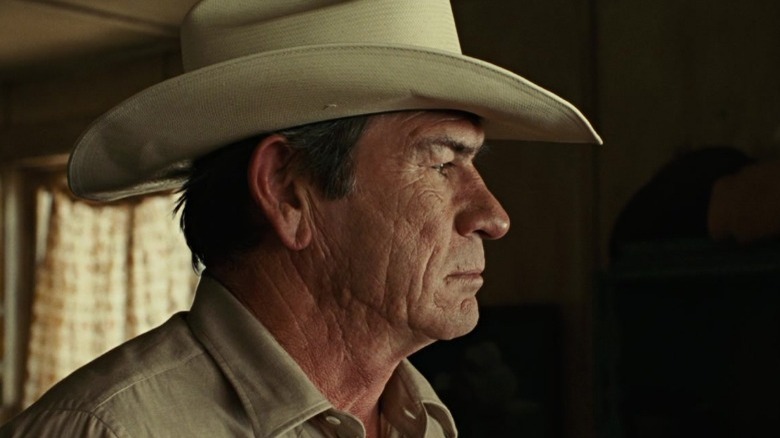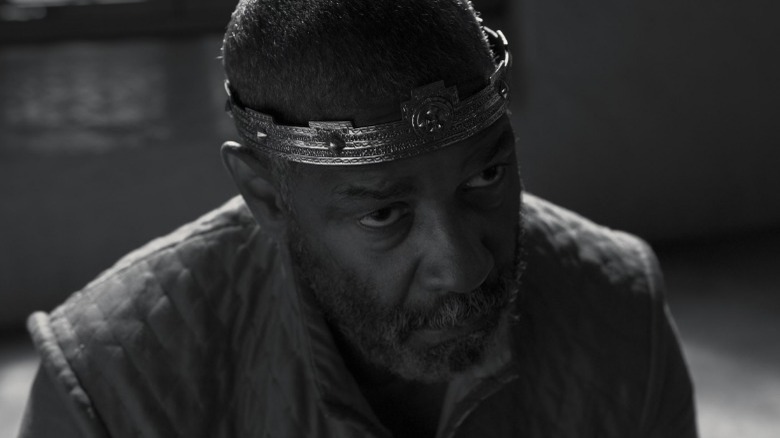Bonafide Facts Only Big Fans Of The Coen Brothers Will Know
How can you tell if somebody is bonafide? According to the Wharvey Gals from "O Brother, Where Art Thou?" you'll know you've found somebody "bonafide" if he proposes with a big ring that has genuine gems — and bonus points if he's not a deadbeat dad who wears a ridiculous hair net to protect his coiffure, like Everett (George Clooney). The Coen Brothers, who directed this quirky movie, are most definitely bonafide because they have given the world several genuine cinematic gems (including "Fargo" and "No Country for Old Men"). And, at least to our knowledge, they don't wear hair nets.
You probably know that the Coen Brothers (directing team Joel and Ethan Coen) can be a little bit eccentric, but you may not know just how gleefully weird these two brothers are. You also may not know, for instance, the outlandish story Ethan came up with to explain his absence from college or the true identity of the Coens' Oscar-nominated collaborator. Below we've compiled the wildest facts about the Coen Brothers that only big fans will know.
The Coen Brothers made lumberjack films as kids
The career of the Coen Brothers dates back to their childhood in the 1960s when they shot amateur films on a Super 8 camera. Joel explained in a 1985 interview with Film Comment, "We remade a lot of bad Hollywood movies that we'd seen on television." For instance, they created their own version of "The Naked Prey" called "Zeimers in Zambia." As well, the two boys also created some original films of their own.
When you're an amateur filmmaker, you need to make the most of what you've got. For Joel and Ethan, it was often snowing in their Minnesota hometown, and the brothers had plenty of flannel shirts, so these factors informed the type of films they made as kids. Joel told The Washington Post, "We'd go into the woods and say, 'Snow and woods — let's make a lumberjack movie.'"
Looking back on these projects, Ethan told Film Comment, "They were incredibly cheesy." Joel admitted that they didn't even grasp the concept of editing in these films, so they would try to capture everything in one continuous shot in real-time. To be fair, the brothers were resourceful for their special effects. To stage a parachute drop in their films, they would film a plane flying overhead, then switch to a miniature with a toy man wearing a parachute. The brothers lived nowhere near an airport, so "it was hell waiting for the airplane to fly by," according to Ethan.
Ethan Coen faked a ridiculous injury to excuse his absence from college
The Coen Brothers soon moved from shooting home videos to studying film and philosophy in college, though Ethan said that his experience at Princeton wasn't all positive. "I had had enough of school for a while," he shared in an interview with the Princeton Alumni Weekly. "I just thought, man, I've gotta take a year off."
Ethan did exactly that, but he forgot to inform the school of his intentions to return, so they assumed he had just dropped out. "I was late and I didn't really have any excuse for being late," he told The Washington Post, "so I said in my letter that I had been involved in a hunting accident in my brother-in-law's living room and had lost my left arm." Not realizing that Ethan was pulling his leg, the dean simply offered Ethan his condolences and requested he submit a doctor's note. In response, Ethan wrote a fake doctor's note and signed it "Reverend Doctor Samson Gaziorwitz of the Our Lady of the Eye, Ear, Nose and Throat Hospital." This so-called doctor pointed out that Ethan's legs had been amputated, too, "so his classes should be scheduled close together," according to Joel.
Amazingly, the letter worked. However, Princeton (finally realizing that Ethan hadn't lost any limbs) insisted that Ethan be examined by a psychiatrist before they could let him return. Ethan passed the psychiatric examination and then finished his education with his limbs intact.
The Coen Brothers got creative when raising money for their debut
The Coen Brothers wanted full creative control over their debut film, "Blood Simple," which meant they needed to fund it themselves. The brothers went from door to door, asking business owners like dentists and urologists to help raise half a million dollars to make the film.
In order to convince investors, the Coen Brothers needed to film a short "proof of concept" clip — in other words, a trailer for a movie that didn't exist yet. This was a trick they had learned after working with Sam Raimi. "Sam taught us that if you call on the phone and ask people to invest in a movie they'll tell you to go to hell," said Joel in an interview for the Criterion Collection edition of "Blood Simple" (via Indiewire). "But if you tell them 'I have a piece of film to show you,' then some of them would let you come into their living room and set up your little projector and show it to them."
To shoot the trailer, the Coen Brothers rented a film camera that they could only use for one day, but they cleverly rented it right before President's Day weekend so they could use it for three. Their efforts paid off — not only did the Coens meet their fundraising goal, but their final film also made a profit of $650,000 and won the Sundance Grand Jury Prize.
The brothers wrote a script about Einstein clones
Although the Coen Brothers have written countless scripts that they turned into movies, they do have a couple of scripts that have never been produced. However, the brothers insist that these scripts were unproduced for a reason: " ... either because there were artistic problems we couldn't resolve or because the cost of producing them would have been prohibitive," Joel told Positif (via Cinephilia Beyond).
One such script was called "Coast to Coast," the brothers shared in an interview with Film Comment. When asked what the story was about, Ethan simply explained, "It had twenty-eight Einsteins in it. The Red Chinese were cloning Albert Einstein." With a premise like that, "Coast to Coast" might have become an over-the-top comedy even more bonkers than "Raising Arizona" or "O Brother, Where Art Thou?"
Alas, it wasn't meant to be. Joel told Positif that he and his brother don't particularly miss any of the scripts they abandoned. "You get drawn into another film, and it becomes your sole preoccupation," he explained. So it looks like we won't be seeing any Einstein clones on the screen anytime soon.
The Coen Brothers get ideas by listening (and napping)
When asked by Fresh Air about their writing process, the Coen Brothers gave a glib answer. "It's mostly napping," said Ethan. To clarify what he meant, he explained that the directors spent a lot of time lounging around their office, waiting for a spark of inspiration. "We take naps, but, you know, the important thing is that we're at the office, should we be inspired to actually write something."
When they're not napping, the two brothers can be found stealing dialogue from random strangers. Film editor Michael Miller revealed their screenwriting secret in a 1987 interview for American Film. He said that the two directors would often hang out at Woolworth's lunch counter, where they paid attention to what the other customers were saying, just in case they found a gem they could use in their script. According to Miller, much of the dialogue at the beginning of "Blood Simple" came from eavesdropping.
"Their attention is never more riveted than when they're in the backseat of a taxi," said Miller. "Once ... the [taxi] driver had a ball game on — the Mets were playing someone and it was in the heat of the pennant drive — and Joel said, 'What's the game?' and the cab driver said, 'Baseball, I think.' They loved that." So you should probably be careful when talking to the Coens — you never know if your words might end up in one of their movies.
The directors feared they would never find somebody to play Llewyn Davis
When the Coen Brothers were writing the script of "Inside Llewyn Davis," they weren't thinking about who they might cast. Doing so would have only hindered their creative process because nothing will trigger writer's block faster than the looming specter of production logistics. Joel told Sight and Sound, "You have to feel like you can write whatever you want."
However, once the Coen Brothers were ready to begin casting Llewyn Davis and developing the film's musical voice, they realized that they might have written themselves into a corner. "There was a point at which we wondered if we'd written something that was essentially impossible to cast," Joel shared in an interview with Breitbart. See, the brothers wanted to show Llewyn performing each of his songs from start to finish; for that, they needed somebody who was an excellent singer. Yet, they also needed a talented actor who would be able to carry the film.
The Coens quickly discovered that it was nearly impossible to find somebody who could do both. "We auditioned a few [musicians]," Ethan recalled. "It's always interesting to see them play, but then you would do a scene and you go, 'My God, this person is not an actor.'" When they finally found Oscar Isaac (who could act and sing at the same time), he was a lifesaver. "[The film] just didn't happen until [Isaac] walked in the room," Joel said.
The brothers wanted Barton Fink's hotel to embody Karl Mundt
Hotel Earle, a major setting from the Coen Brothers' film, "Barton Fink," is an unsettling place. According to Joel, he and his brother had envisioned the hotel as "a ghost ship floating adrift, where you notice signs of the presence of other passengers, without [ever] laying eyes on any" (according to an interview with Positif, via Cinephilia Beyond). This atmospheric setting is almost like a character itself. In fact, the brothers deliberately designed the hotel to mirror the character Karl Mundt (John Goodman) and be almost an extension of Mundt's body. "The sweat drips off his forehead like the paper peels off the walls," Joel explained.
All these details linking Mundt to the hotel led one fan to propose a unique theory. The brothers were on a promo tour in Japan, Ethan told The Huffington Post, when a journalist asked if Mundt existed only in Fink's imagination. Specifically, they wanted to know if there was any truth to the theory that Mundt was actually the spirit of the hotel, or at least what Fink imagined the spirit of the hotel would look like. Ethan had never considered that theory before, so he gave an ambivalent answer. "What are you gonna tell them?" he told The Huffington Post. "You say, 'No,' you're a killjoy. And you say, 'Yes.' That's not exactly true." Of course, Joel pointed out that technically this fan theory wasn't too far off the mark.
The Coen Brothers had difficulty with their trained animals
The Coen Brothers have sometimes struggled with trained animals in their films. Ethan told Fresh Air that they used a trained vulture to film "True Grit," and the animal didn't always cooperate because it was "[even] by vulture standards ... probably a stupid vulture." However, Ethan added, "I would take a vulture over a cat. The cat was just horrible."
The animal in question was the tabby cat from "Inside Llewyn Davis," and the Coens agreed that cats are near-impossible to train, much less direct. "Shooting a cat is pretty nightmarish because they ... don't want to do what you want them to do." The brothers needed to swap out animals between shots, trying to find a cat that felt in the mood to do what they wanted. They'd bring in a friendly feline for a shot where Davis was holding the cat, then swap it out for a restless one when it was supposed to run away. Naturally, this was exhausting.
They even needed to worry about animals that didn't even exist. No cows were harmed in the scene from "O Brother, Where Art Thou?" in which a cow gets blown to smithereens. Still, the brothers needed to share behind-the-scenes footage with the American Humane Society to prove the cow was indeed CGI, according to an interview with Playboy. "When they saw the cow scene they didn't believe it was computer generated, but I assure you it was," Joel said.
The directors hired (and fired) multiple babies for Raising Arizona
Although only five babies appear in "Raising Arizona," the Coen Brothers actually cast 15 babies. This is because babies are notoriously fickle actors. If the directors couldn't get the desired performance from one baby, they would swap it out for a fresh one, Ethan explained to Fresh Air. When they weren't using these babies, the directors kept them in what they called "the baby pit," a padded playpen where all 15 infants hung out. "Whenever we needed a baby we reached into the pit and grabbed one. It was kind of like a barbecue pit," Ethan joked in an interview with Playboy.
The Coen Brothers weren't ones to coddle their toddlers. Joel explained that the script called for babies who hadn't yet learned how to walk ("We only wanted crawlers," he told Fresh Air) which became a problem whenever some of their young actors started to take their first steps. "We kept firing babies when they wouldn't behave," Joel shared in an interview with American Film. "They didn't even know they were being fired, that's what was so pathetic about it." According to the Coen Brothers, one parent tried to prevent her little bundle of joy from getting the sack by concealing the fact that her son could walk. She put the baby's shoes on backward so he wouldn't be able to walk — and thus he could be a movie star for a little while longer.
Their Oscar-nominated collaborator doesn't exist
Although the Coen Brothers often edit their own films, they have chosen to credit their editing work under a pseudonym. Ethan told Fresh Air in 2013, "Our names are in the credits so many times already that adding one more just seemed like bad taste." Thus Roderick Jaynes was born. The brothers invented a whole backstory for their alter ego: Jaynes lives in the British town of Howards Heath and only came out of retirement to assist the Coen Brothers. "He's very old," Ethan told Fresh Air. "In his 80s, actually, when we first started working with him, which would make him probably over 100 now" (the Coen Brothers later revealed the identity of Jaynes in a blink-and-you-miss-it moment at the end of an essay written for The Guardian).
This setup put the Coen Brothers in an awkward situation whenever Jaynes was nominated for an Oscar in editing on two separate occasions. See, if Jaynes had won the Oscar, the Coens couldn't accept the award on his behalf, due to Academy rules. "They don't allow proxies to accept awards at the Academy Awards, ever since Marlon Brando and Sacheen Littlefeather," Joel explained to The Vulture. Regardless, Jaynes didn't win, and the Coen Brothers made up a story to explain his absence from the ceremony. When asked by Fresh Air in 2008 if Jaynes would make a public appearance, Joel said simply, "Roderick Jaynes doesn't travel." Ethan added, "He's a cantankerous old fart."
The Coen Brothers may not collaborate on a movie again
As any Coen Brothers fan knows, the two were inseparable for over 30 years, collaborating on all of the same projects together. However, following their 2018 film, "The Ballad of Buster Scruggs," they each began working on their own separate projects. Ethan explained the reason for this choice in an interview with AP News. "You start out when you're a kid and you want to make a movie," he said. "The first movie is just loads of fun ... [Yet] after 30 years, not that it's no fun, but it's more of a job than it had been ... It's an inevitable by-product of aging." Ethan concluded, "The experience of making a movie [was] more of a grind and less fun."
Joel went on to direct the 2021 movie, "The Tragedy of Macbeth." Meanwhile, Ethan announced to The LA Times he would be taking a break from movies so he could focus more on theater. Later, Ethan felt ready to return to the film medium, and in 2022, began shooting his first solo film, which was based on a script that he and his wife had written in the mid-2000s.
However, we may still see this dynamic directing duo collaborate again. "None of the decisions are definitive," Ethan told AP News. "We might make another movie." In fact, the brothers are rumored to be working together on developing the script for "The Zebra Striped Hearse," according to World of Reel.
